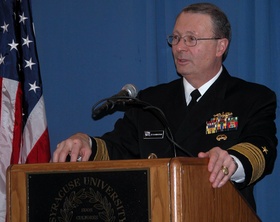|
SYRACUSE, N.Y., March 29, 2006 – The global war against terrorism is as much a struggle of ideas as it is a military conflict, the Pentagon's No. 2 military officer said here today.

Navy Adm. Edmund P. Giambastiani, vice chairman of the Joint Chiefs of Staff, addresses reporters' questions during a news conference at Syracuse University in upstate New York, March 29. Photo by Gerry J. Gilmore
(Click photo for screen-resolution image);high-resolution image available. |
|
The anti-terror war is actually a battle between Islamic moderates and extremists, and not a face-off between Western and Middle Eastern thought, Navy Adm. Edmund P. Giambastiani, vice chairman of the Joint Chiefs of Staff, said during remarks at a luncheon at Syracuse University. "This is not a clash between civilizations, but within one civilization - the Muslim world," Giambastiani said. "This, in many senses, is an ideological civil war between one hard-line view of what Islam means and what such a meaning demands." Radical Islam adherents like Osama bin Laden preach a violent, exclusionary world view that preys on the impoverished, young and uninformed among Islam's 1 billion-plus followers, Giambastiani said. However, Muslim expressions of faith are largely peaceful and have comfortably coexisted in the modern world, Giambastiani said. Mainstream Islamic thought also abhors and rejects the violence committed by bin Laden and his followers, the admiral said. "In my view, this war of ideas targets the real center of gravity for what we call the 'Long War,'" Giambastiani said. The struggle between moderate and radical Muslims puts the interpretation of the religion at stake, he said. "And that acceptance or rejection is at the heart of this war of ideas that we are in fact engaged in today," Giambastiani said. Proponents of radical Islam want to chase the United States from the Middle East, Giambastiani said, and then overthrow the current governments, replacing them with functionaries that mirror radical ideology. The radicals also want to create safe havens across the world, he said, to be used to conduct ideological and terrorism training of new members. The Islamic extremists don't fly a national flag, nor do they field conventional armies, navies, or air forces, Giambastiani said. The radicals' chief weapon is terrorizing innocent people, and they do so through the use of improvised explosive devices to gather headlines and spread fear. "They use these IEDs to kill innocent civilians; victims with no tactical military value, but immense strategic import," Giambastiani said. The terrorists employ fake companies to raise funds, bribe politicians and financiers and enlist sympathetic charitable and civic organizations to parrot their ideas, Giambastiani said. They employ the Internet for planning, recruiting, financing, propaganda and training, he added. The radicals are plotting to obtain weapons of mass destruction, Giambastiani said, and their plans also include seizing control of the world's oil resources. The ultimate goal of al Qaeda and other radical Islamic organizations is to "bankrupt and exhaust" the United States and other enemies and achieve world domination, the admiral said. "These enemies in this global war on terrorism seek to abolish our - your -- way of life," Giambastiani pointed out. Governments that don't reflect the radicals' world view will be replaced "with the rules of an extremist, Islamic, empire," he said. The Islamic radicals are unified by their extremist ideology, and their loosely knit terror networks make it difficult to catch and defeat them on a conventional battlefield, Giambastiani said. "Ideas can't be eliminated by simply using guns," Giambastiani pointed out. And today, there's intense debate within the U.S. government and military about how to employ strategic communications to counteract the propaganda propagated by the terrorists, the admiral said. "But, to my mind, we still haven't come up with a good enough strategy or even enough good ideas for competing in the war of ideas in this Islamic civil war in a way which strengthens the hand of the Islamic moderates against their hard-line, extremist co-believers," Giambastiani said. In this struggle for the hearts and minds of the Islamic and Middle Eastern people, there's no doubt the United States' military "has great capability in our special forces to deal with other cultures," Giambastiani said to reporters during an after-luncheon news conference. And today, the "vast bulk" of the training of Afghan and Iraqi security forces is being performed by conventional U.S. military members embedded in training units, the admiral said. Those U.S. trainers obviously have cultural and linguistic awareness as they work with and teach Afghans and Iraqis, Giambastiani said. "And we are extending this (concept) across-the-board" to more American soldiers and Marines, the admiral said.
|